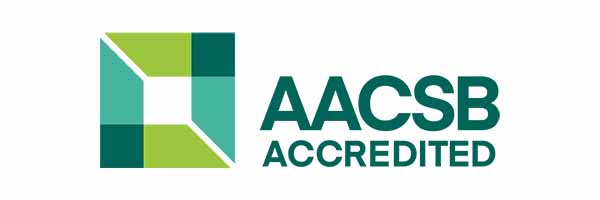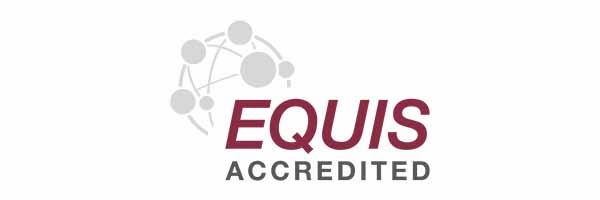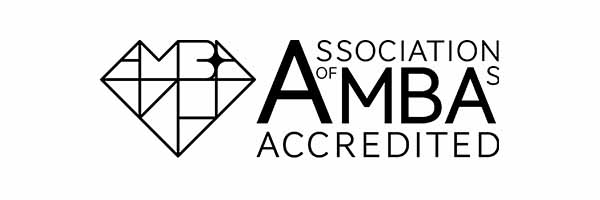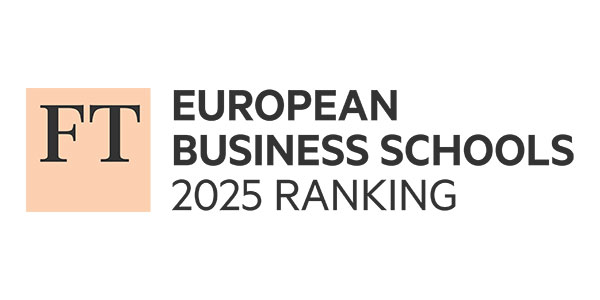BA Joint Hons Finance & Mathematics and Statistics
ApplyKey facts
- UCAS Code: NG33
- Accreditation: triple-accredited Business School - AACSB, EQUIS, AMBA
Part-time study: available
Applicant visit days: these take place in March each year
Study with us
- develop mathematical and statistical expertise along with the opportunity to broaden your skills in business
- Finance, Mathematics and Statistics provides a good basis for entering the actuarial profession
The Place of Useful Learning
UK University of the Year
Daily Mail University of the Year Awards 2026
Scottish University of the Year
The Sunday Times' Good University Guide 2026
Why this course?
This joint degree is offered in partnership with the Department of Mathematics & Statistics.
You’ll develop mathematical and statistical expertise at the same time as increasing your skills in the largest business school in Scotland. There’s strong emphasis on statistical techniques in data analysis and on the use of mathematical models.
Employers in the financial sector look for graduates who have experience using mathematical models, as well as a financial background. This course provides a good basis for entering the actuarial profession.
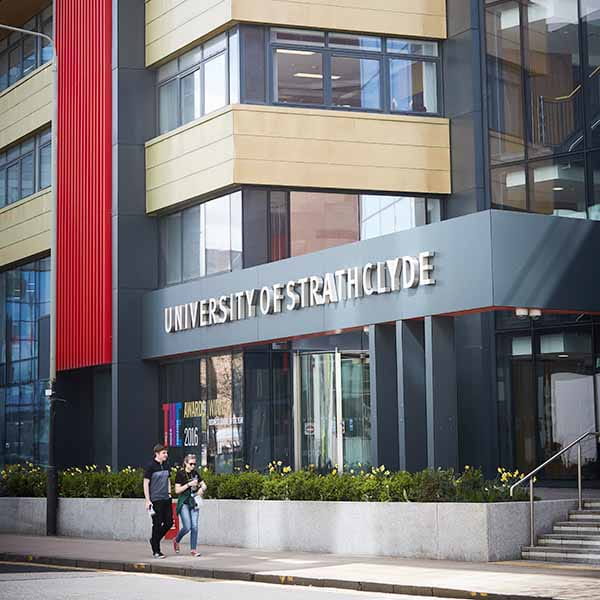

Create your own course
Modern business is too complex to be covered by a single subject: modern managers need to have a broad outlook.
You'll follow a broad-based Year 1 curriculum which will introduce you to a wide range of business disciplines, alongside the Business School’s core modules for business knowledge and skills (the Management Development Programme), and academic skills support.
This provides you with the opportunity to try new subjects, some of which you won’t have experienced at school or college. At the beginning of Year 2, you choose two subjects to continue studying in Years 2 and 3, plus further MDP modules in Years 2 and 3.
Triple-accredited business school
What you’ll study
Each year contains compulsory classes and some years contain either optional classes in different areas of mathematics, and/or elective classes from other subject areas in the University.
Mathematics and statistics account for at least half of each course, with the remainder devoted to finance. You’ll be able to choose the particular areas of finance, mathematics or statistics you want to specialise in.
Years 1 & 2
In addition to the study of core mathematical methods, you’ll study applied analysis, mechanics, numerical analysis and statistics.
Years 3 & 4
You can choose from a range of mathematics and statistics classes from one or more of the specialist application areas.
The Honours-year project may be in finance, mathematics or statistics.
Progression requirements
Please note: competitive progression requirements are in place for entry to the Honours year – currently this is a 55% average in the Year 2 and 3 subject modules.
Finance
Finance options include:
- Business Finance
- Financial Markets
- Portfolio Theory
- Security Analysis
- Treasury Management
Maths & Stats
Topics offered in maths Honours-year classes include:
- Dynamical Systems and Chaos Theory
- The Mathematics of Finance and Mathematical Modelling in Biology and Medicine
Financial markets simulation experience
You can gain invaluable practical experience of the factors that drive today’s financial markets as part of your course.
Amplify, a global financial trading and training company, in collaboration with Strathclyde Business School, delivers a financial markets simulation experience during the academic year. This provides you with the opportunity to experience a real-life trading simulation, covering multiple roles in the process.
Amplify is a leading provider of training programmes to the financial industry, and they offer our students the same analyst-level practical training they deliver to their clients. Amplify’s clients include:
- Bank of China
- Goldman Sachs
- HSBC
- Bank of America
Note: the provider of this boot camp may be subject to change.
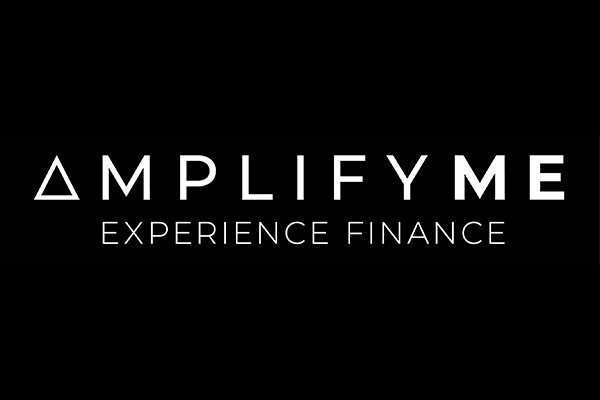
Course content
In Year 1 you'll study a range of business disciplines across four subject modules, plus three core integrating modules in international business, business knowledge and skills (via the Management Development Programme) and academic skills. This will provide you with a foundation in business and enable you to appreciate how your chosen specialism fits with other business subjects. From Year 2 you'll take modules in the subjects in which you choose to specialise.
The Management Development Programme (MDP) is a central element of the undergraduate programme in the Strathclyde Business School. The programme runs for the first three years of the BA degree and is driven by real business problems. The approach to learning is active problem-based, with students working in project teams. The MDP provides an opportunity to integrate the knowledge and experience gained from your business subjects. Each year of MDP focuses on different aspects of business and the content of MDP is constantly evolving and being updated and enhanced.
Alongside the MDP you'll also take an Academic Skills module which will equip you with essential key skills to support your studies.
Finance
Introduction to Finance and Financial Analysis
This module will provide you with an introduction to finance and accounting, covering the basic concepts and practicalities of corporate finance, the principles of valuation, financial management and business investment, the role and purpose of company accounts and their usefulness, security analysis, risk and returns from investments, and personal finance.
At all times the module content will be linked with financial behaviour and events in the real world.
Introduction to International Business
This module introduces learners to the field and practice of international business and management.
Drawing on classical and recent debates in theory and practice including, but not limited to commercial concerns, learners will be equipped with an understanding of the foundational principles and developments of the subject.
In the module, we consider how international business and management is researched, and facilitate a critical understanding based on real-life case studies in international contexts. This module gives learners the capacity to look at the past, present and future in organisations and provides the foundations for intellectual progression in the subject, and broadly, for year two and beyond.
Introduction to Marketing & Entrepreneurship
The aim of this module is to provide you with a solid foundation and understanding of the theories and principles underlying marketing and entrepreneurship. A combination of the subjects will be taught to enhance understanding of the way the two disciplines address issues related to both the macro and micro-environment contexts of markets and entrepreneurship.
Marketing is everywhere in contemporary society. It plays a central role in business as it is concerned with the creation and retention of customers. The module is designed to give you a foundational understanding of marketing and a critical introduction to the topic of marketing in both theory and practice through a series of lectures and workshops.
In your first-year class you will explore the core concepts of value and exchange. You will learn what marketing is and its core principles such as analysing the marketing environment, developing a marketing strategy, and dealing with the marketing mix i.e., product, price, place, and promotion. You will learn how organisations develop a customer centric approach to marketing and how that can create a competitive advantage in a dynamic business environment.
The assessment for this module will involve individual coursework.
In this module, you will be exposed to concepts and ideas from economics, sociology, psychology, geography and other social sciences, all in the context of the competitive business environment.
Entrepreneurship too is a complex process involving many different skills and activities, though it is based upon a 'mindset and process by which an individual or group identifies and successfully exploits a new idea or opportunity. For this part of the module, you'll be working in teams to learn about the ideation process, which forms the foundations of new venture creation, in our Creative Challenge.
Introduction to Economics and Business Analysis & Technology (20 credits)
The module will provide you with a balanced introduction to economics which will be based on a programme of systematic directed reading, supplemented by experiments and exercises undertaken in tutorials.
The module uses the innovative CORE (Curriculum Open-Access Resources in Economics) Econ resources, which provides a complete introduction to economics and the economy. CORE Econ teaches about the economy and economics by starting from a question or a problem about the economy - why the advent of capitalism is associated with a sharp increase in average living standards, for example - and then teach the tools of economics that contribute to an answer. This innovative approach ensures that students understand how the tools of economics can help us understand the modern economy.
The second half of the module is the study of how analytical thinking, scientific method and associated tools can be used to help decision making. This Business Analysis element of the module will provide an overview of where methods and tools are widely used across a large range of industries including the manufacturing, retail, healthcare, financial services, travel, and electronics industries, as well as in local and national government.
Examples of where Business Analysis is put into practice are:
- the management of new building projects
- the design of efficient transport systems and plant layouts
- personnel scheduling
- allocation of resources and financial modelling and forecasting
This area of expertise can help to reduce costs, increase revenues, improve customer service, increase efficiency and can even save lives.
Introduction to Tourism Studies and Managing People
This module includes two thematic parts which run in parallel across the semester. One part, Introduction to Tourism Studies, introduces tourism management as both, international business and as a global cultural phenomenon.
It provides insights into key concepts and theories to understand the intricacy of this industry in commercial, cultural and environmental terms. The other part, Managing People, focuses on the contemporary and practical issues of how people are organised and managed in the workplace and examines different theoretical perspectives which help our understanding of the complex relationship between the employer and the employee in the contemporary business environment.
Management Development Programme 1
The ICE Pathway - “Innovation, Commercialisation & Entrepreneurship”, where you'll learn about the Foundations of 'What is Business’. Alongside:
- Personal & Professional Development: Who am I? How Do I learn? How do I lead & work in a team?
- Knowledge & Practice: What is a business/organisation? Why does this matter? How does this affect society?
- Experiential Learning: Real-world cases & clients; team-based and student-centred Learning approaches
Academic Skills
This class aims to support you in developing key skills that are important to both your academic and future career. These include skills associated with:
- research
- data analysis
- critical writing
- team working
- communication
Mathematics & Statistics
Mathematical Foundations (20 credits)
This covers the basic concepts and standard methods of mathematical notation and proof; functions; complex numbers and variables; solution of equations; resolution of inequalities; sequences and series.
Calculus 1 (20 credits)
This introduces the fundamental concepts of calculus, and develops some of their applications including basic ordinary differential equations.
Management Development Programme 2
Topics
Semester 1 topics include:
- Working in Business Organisations
- Working Business Research & Consultancy
- Working Internationally
- Working in the Third Sector
- Rhetorics & Oratory
Semester 2 is about developing the proposal of Management Development Programme 3; with a presentation and a final report.
Class description
The second year concentrates on developing understanding through industry-specific contextualisation. Sessions are weekly and three hours in length.
The sessions are thematically linked to the pathways for individualised experience in third year whilst also drawing on the theoretical knowledge developed in Management Development Programme 1. In order to develop understanding, organisations will deliver a half-day session. This consists of a one hour plenary introduction where the company and case study are introduced. This is followed by the group sessions where you undertake activities in relation to the case study set by the company.
Finance
Course summary
Second year classes cover:
- investment and financial decision-making and policies in business
- risk and return and the pricing of company shares
- portfolio selection and the efficiency of financial markets
- the valuation of bonds and bond portfolio management
- equity trading strategies
- statistical and spreadsheet methods of analysing financial problems and strategies
Mathematics & Statistics
Linear Algebra & Differential Equations (20 credits)
This module will introduce you to the basic ideas of linear algebra, such as matrices and determinants, vector spaces, bases, eigenvalues and eigenvectors. You'll study various standard methods for solving ordinary differential equations and understand their relevance.
Probability & Statistical Inference (20 credits)
This module will present the basic concepts of probability theory and statistical inference and provide you with the tools to appropriately analyse a given data set and effectively communicate the results of such analysis.
Mathematical & Statistical Computing (20 credits)
This module will introduce you to the R computing environment. It'll enable you to use R to import data and perform statistical tests, allow you to understand the concept of an algorithm and what makes a good algorithm and will equip you for implementing simple algorithms in R.
Management Development Programme 3
The third year of centres on individualised experience in an organisational context through one of the following pathways:
- Internship/Charities - gain practical experience in a private or third sector organisation. You need to negotiate and locate your own organisation and experience – this is one of the key learning points of the pathway.
- Research and consultancy - a facility for local small businesses to gain from the experience and expertise of those within Strathclyde Business School. You work on two live business consultancy projects (one in each semester) and, as a team of six, develop solutions and strategic initiatives for the local SME economy.
- International experience – only available for students who are undertaking an international exchange for either one semester or full year.
- Vertically Integrated Projects - working on a cross-faculty basis to research longitudinal projects (including the ‘Bill Gates Toilet Challenge, Solar Panels for Gambia and Enterprise in Schools) you work with a team of students from all levels of study (first year undergraduate to final year PhD) to further the work of the project.
In addition, you’re required to undertake a social responsibility element (this accounts for one quarter of the overall workload).
These have been designed to provide support to the Curriculum for Excellence and the Widening Access to Higher Education programme. There are no formal classes for Management Development Programme 3 although there is pathway support with the pathway leads and tutor support.
Finance
Course summary
Areas covered in third year classes include:
- advanced corporate finance and financial markets issues
- valuation of derivatives, such as options and futures and swaps
- the operations of derivatives markets
- hedging strategies
- treasury and international financial risk management in business
Advanced methods of empirical analysis, such as event studies, and access to historic and live data are also included.
Mathematics & Statistics
Differential Equations (20 credits)
In this module we’ll introduce you to analytical methods for solving ordinary and partial differential equations, so you'll develop an understanding along with technical skills in this area.
Inference & Regression Modelling (20 credits)
This module will:
- review the concepts of probability distributions and how to work with these
- present approaches to parameter estimation, focusing on maximum likelihood estimation, bootstrap estimation, and properties of estimators
- present hypothesis testing procedures, including classical likelihood ratio tests and computer-based methods for testing parameter values, and goodness-of-fit tests
- introduce and provide understanding of the least squares multiple regression model, general linear model, transformations and variable selection procedures
- present use of R functions for regression and interpretation of R output
Optional classes
Complex Variables & Integral Transforms (20 credits)
This module will introduce functions of a complex variable, define concepts such as continuity, differentiability, analyticity, line integration, singular points, etc. You will examine some important properties of such functions and consider some applications of them, for example, conformal mappings and the evaluation of real integrals using the Residue Theorem. You will also be introduced to Fourier and Laplace transform methods for solving linear ordinary differential equations and convolution type integral equations.
Linear Algebra (20 credits)
In this module we'll introduce basic algebraic structures, with particular emphasis on those pertaining to finite dimensional linear spaces and deepen your understanding of linear mappings. We'll also provide an introduction to inner product spaces and bilinear forms.
Numerical Analysis (20 credits)
This module will motivate the need for numerical algorithms to approximate the solution of problems that can’t be solved with pen and paper. You’ll develop your skills in performing detailed analysis of the performance of numerical methods and will continue to develop your skills in the implementation of numerical algorithms using R.
Stochastics & Financial Econometrics (20 credits)
You'll be introduced to the basic concepts of random phenomena evolving in time, from two complementary points of view: probabilistic modelling and data-driven analysis. Presentation of underlying ideas of simple stochastic processes, time series models, and the associated probability theory and statistical techniques will be covered. In addition to applications of the methods to financial and economic systems, including modelling, data analysis, and forecasting.
Finance
Course summary
You can either specialise in Finance as a Single Honours subject or continue to a Joint Honours degree in Finance and your other principal subject. In order to gain entry to Honours year, you must meet specified performance criteria in Years 2 and 3.
Students taking Single Honours in Finance will do a research dissertation in Finance, while Joint Honours students typically have the choice of doing their dissertation in either Finance or their other subject. Honours classes cover advanced topics in the following areas:
- corporate investment
- corporate financing
- asset pricing
- portfolio analysis
- derivatives
- international financial management
- behavioural finance
- international corporate governance
- financial quantitative methods
Mathematics & Statistics
Communicating Mathematics & Statistics (20 credits)
This module provides you with experience of the skills required to undertake project work, and to communicate the findings in written and oral form using a variety of sources, such as books, journals and the internet. You will undertake an individual research project, researching a mathematical or statistical topic and writing a short report on it.
Optional classes
Modelling & Simulation with Applications to Financial Derivatives (20 credits)
In this module you'll get an introduction to ideas in mathematics and statistics that can be used to model real systems, with an emphasis on the valuation of financial derivatives. This module places equal emphasis on deterministic analysis (calculus, differential equations) and stochastic analysis (Brownian motion, birth and death processes). In both cases, in addition to theoretical analysis, appropriate computational algorithms are introduced.
The first half of the module introduces general modelling and simulation tools, and the second half focuses on the specific application of valuing financial derivatives, including the celebrated Black-Scholes theory.
Statistical Modelling & Analysis (20 credits)
You will be provided with a range of applied statistical techniques that can be used in professional life. This module provides you with the fundamental principles of statistical modelling through experimental design and multivariate analysis.
Applied Statistics in Society (20 credits)
In this module you'll be introduced to a range of modern statistical methods and practices used in industry, commerce and research, and you will develop skills in your application and presentation.
Applicable Analysis 3 (20 credits)
This module will present the main results in Functional Analysis. You will also be introduced to linear operators on Banach and Hilbert spaces and study applications to integral and differential equations.
Fluids & Waves (20 credits)
In this module you'll be introduced to the theory of Newtonian fluids and its application to flow problems and the dynamics of waves on water and in other contexts.
Finite Element Methods for Boundary Value Problems & Approximation (20 credits)
In this module you'll be presented with the basic theory and practice of finite element methods and polynomial and piecewise polynomial approximation theory.
Mathematical Biology & Marine Population Modelling (20 credits)
In this module, you'll learn the application of mathematical models to a variety of problems in biology, medicine, and ecology. The module will show:
- the application of ordinary differential equations to simple biological and medical problems
- the use of mathematical modelling in biochemical reactions
- the application of partial differential equations in describing spatial processes such as cancer growth and pattern formation in embryonic development
- the use of delay-differential equations in physiological processes.
The marine population modelling element will introduce the use of difference models to represent population processes through applications to fisheries, and the use of coupled ODE system to represent ecosystems. Practical work will include example class case studies that will explore a real-world application of an ecosystem model.
Elasticity & Complex Materials
We'll introduce you to general continuum theory with applications to Newtonian and non-Newtonian fluids and elastic materials.
Optimisation: Theory & Practice
We'll provide you with a basic mathematical understanding of modern approaches to optimisation and the calculus of variations.
Statistical Mechanics
Here you'll develop approaches to understanding complex or random systems in or out of equilibrium, based on ideas from statistical mechanics that incorporate familiar concepts and methods from neighbouring subjects like classical mechanics and probability and statistics.
You'll also be able to describe, through various examples and techniques, how macroscopic properties of systems arise from the ensemble action of many microscopic ingredients, and, specifically, how deterministic 'laws' may arise from basic randomness of a system with many variables or degrees of freedom. Fundamental examples include Brownian motion and the ideal gas.
Dynamical Models in Epidemiology
We'll introduce mathematical models which arise in epidemiology and population dynamics, and help you develop techniques for analysing the qualitative behaviour of the associated dynamical systems.
Introduction to Econometrics
Learning & teaching
In mathematics and statistics, you’ll learn through (using a variety of media including electronic presentations and computer demonstrations), tutorials, coursework and projects.
You’ll also learn through group work in problem solving and student presentations.
Finance is taught over two semesters in blocks of 12 weeks each. Learning methods include lectures, tutorials, and seminars. You'll also learn through team-based action learning projects, online materials and interactive sessions using personal response systems.
Our business partners are often involved in the teaching and/or assessment of student presentations.
The innovative and highly acclaimed Management Development Programme (MDP) is at the core of our undergraduate degrees in the Business School and comprises a series of classes which you take throughout Years 1 to 3.
You develop knowledge and skills in key areas of management, and team-working, communication and decision-making skills, all of which are highly sought-after by employers.
Major employers and alumni from all sectors are involved in the MDP, participating in group sessions, observing student presentations, and providing feedback. Organisations involved include Barclays, Deloitte, Procter & Gamble and Ernst & Young. In first year the best teams are selected to present to senior staff in one of the sponsoring organisations, and there are prizes for the best projects.
The programme builds your confidence and entrepreneurial capabilities, and promotes awareness of globalisation and ethical issues in personal and business decision-making. In Year 3, you develop your own pathway from internships, involvement with business projects, engagement in interdisciplinary activities and business clinics.
Assessment
You normally have one opportunity to be re-assessed for a failed class. For unseen exams, this normally takes place during the summer.
In mathematics and statistics, knowledge, understanding and subject-specific skills are assessed by coursework, assignment, reports, presentations and written exams.
In finance, the majority of classes involve unseen exams, business reports, case studies, essays, presentations, individual and group projects, learning journals and peer assessments.
Entry requirements
Required subjects are shown in brackets.
| Highers | Highers Standard entry requirements*:
(Higher English B; Maths National 5 B, or equivalent; Higher Maths A for combinations with Accounting) Minimum entry requirements**:
(English Higher B, Maths National 5 B) |
|---|---|
| A Levels | ABB-BBB (GCSE English Language 6/B or Literature 6/B, or an essay-based A Level B may be considered in lieu of English; GCSE Maths 6/B; A Level Maths A for combinations with Accounting) |
| International Baccalaureate | 32-30 (no subject below 5 and including English SL5, Maths/Maths Studies SL5; Maths HL5 for combinations with Accounting or Maths & Statistics) |
| HNC/HND | Relevant HNC/HND, A in Graded Units; for advice on entry to Year 2 contact Business School Admissions: |
| International students | View the entry requirements for your country. |
| Deferred entry | Not normally accepted. |
*Standard entry requirements
Offers are made in accordance with specified entry requirements although admission to undergraduate programmes is considered on a competitive basis and entry requirements stated are normally the minimum level required for entry.
Whilst offers are made primarily on the basis of an applicant meeting or exceeding the stated entry criteria, admission to the University is granted on the basis of merit, and the potential to succeed. As such, a range of information is considered in determining suitability.
In exceptional cases, where an applicant does not meet the competitive entry standard, evidence may be sought in the personal statement or reference to account for performance which was affected by exceptional circumstances, and which in the view of the judgement of the selector would give confidence that the applicant is capable of completing the programme of study successfully.
**Minimum entry requirements
Contextual Admissions for Widening Access
We want to increase opportunities for people from every background.
Strathclyde selects our students based on merit, potential, and the ability to benefit from the education we offer. We look for more than just your grades. We consider the circumstances of your education and will make lower offers to certain applicants as a result.
University preparation programme for international students
We offer international students (non-UK/Ireland) who do not meet the academic entry requirements for an undergraduate degree at Strathclyde the option of completing an Undergraduate Foundation Programme in Business and Social Sciences at the University of Strathclyde International Study Centre.
Upon successful completion, you can progress to your chosen degree at the University of Strathclyde.
International students
We've a thriving international community with students coming here to study from over 140 countries across the world. Find out all you need to know about studying in Glasgow at Strathclyde and hear from students about their experiences.

Fees & funding
All fees quoted are for full-time courses and per academic year unless stated otherwise.
Fees may be subject to updates to maintain accuracy. Tuition fees will be notified in your offer letter.
All fees are in £ sterling, unless otherwise stated, and may be subject to revision.
Annual revision of fees
Students on programmes of study of more than one year (or studying standalone modules) should be aware that the majority of fees will increase annually.
The University will take a range of factors into account, including, but not limited to, UK inflation, changes in delivery costs and changes in Scottish and/or UK Government funding. Changes in fees will be published on the University website in October each year for the following year of study and any annual increase will be capped at a maximum of 10% per year. This cap will apply to fees from 2026/27 onwards, which will not increase by more than 10% from the previous year for continuing students.
| Scotland | To be confirmed. Fees for students domiciled in Scotland are subject to confirmation by the Scottish Funding Council. Scottish undergraduate students undertaking an exchange for a semester/year will continue to pay their normal tuition fees at Strathclyde and will not be charged fees by the overseas institution. |
|---|---|
| England, Wales & Northern Ireland | £9,790 Fees for students domiciled in the Rest of the UK are subject to Parliamentary approval. |
| Republic of Ireland |
If you are an Irish citizen and have been ordinary resident in the Republic of Ireland for the three years prior to the relevant date, and will be coming to Scotland for Educational purposes only, you will meet the criteria of England, Wales & Northern Ireland fee status. For more information and advice on tuition fee status, you can visit the UKCISA - International student advice and guidance - Scotland: fee status webpage. Find out more about the University of Strathclyde's fee assessments process. |
| International | £22,750 |
| University preparation programme fees | International students can find out more about the costs and payments of studying a university preparation programme at the University of Strathclyde International Study Centre. |
| Additional costs | International studentsInternational students may have associated visa and immigration costs. Please see student visa guidance for more information. FinanceCourse materials & costsTextbooks do vary in price from around £40 to £100. The majority are provided free in the library or via the Virtual Learning Environment (VLE) platform. For budgeting purposes, we recommend allowing £200 per academic year for books. Other costsStudents may be required to make hardcopy submissions for some assignments and will cover the cost of printing. Students are required to print and bind their dissertation. The cost will depend on the length of dissertation but an average cost would be in the region of £40. Graduation gown hire. Study abroadTypically, the cost of one semester abroad could be between £6,500 to £8,500 depending on the destination, currency exchange rates and lifestyle choices. Tuition fees are not paid to the exchange institution but continue to be paid to Strathclyde University in the usual way, however students are responsible for their own travel and living expenses i.e. flights, insurance, visa application, vaccinations/associated medical costs, accommodation, food, textbooks etc. Students are eligible to apply for a student loan as usual but must let the award agency (e.g. SAAS) know that they will be studying or working overseas on a compulsory exchange. Students may be eligible for external funding however this is not guaranteed; the University of Strathclyde will continue to participate in the Erasmus programme until May 2023 however are also participating in UK’S Turing Scheme. The Turing Scheme offer contribution towards living costs for students undertaking work or study abroad as part of their degree and is calculated based on length of placement and living costs at destination. Students with an exchange place outside Europe are eligible to apply to the Neil Hood Memorial Fund for a scholarship. Full details of the application process are provided to all eligible students. Other scholarship opportunities may be available through the Alumni & Development department. Mathematics & statisticsCourse materials & costsClass materials (lecture notes and exercise sheets) for the majority of Mathematics & Statistics classes are available free to download. For some classes, students may need access to a textbook. Textbook costs are typically in the £20-60 price range. These prices are dependent on format (e-book, soft or hardback) and whether bought new or second hand. Other costs£40 returnable deposit for PRS handsets. |
| Available scholarships | We have a wide range of scholarships available. Have a look at our scholarship search to find a scholarship. |
Please note: All fees shown are annual and may be subject to an increase each year. Find out more about fees.
How can I fund my studies?
Students from Scotland
Fees for students who meet the relevant residence requirements in Scotland, you may be able to apply to the Student Award Agency Scotland (SAAS) to have your tuition fees paid by the Scottish government. Scottish students may also be eligible for a bursary and loan to help cover living costs while at University.
For more information on funding your studies have a look at our University Funding page.
Students from England, Wales & Northern Ireland
We have a generous package of bursaries on offer for students from England, Northern Ireland and Wales:
You don’t need to make a separate application for these. When your place is confirmed at Strathclyde, we’ll assess your eligibility. Take a look at our scholarships search for funding opportunities.
International Students
We have a number of scholarships available to international students. Take a look at our scholarship search to find out more.
Glasgow is Scotland's biggest & most cosmopolitan city
Our campus is based right in the very heart of Glasgow. We're in the city centre, next to the Merchant City, both of which are great locations for sightseeing, shopping and socialising alongside your studies.
Careers
Our graduates enter industries such as:
- manufacturing
- actuarial, accountancy and banking professions
- commerce and government
- consultancy and education
Many go on to work as financial analysts, accountants, operations analysts, treasury analysts, auditors and management trainees.
Apply
Start date:
Finance, Mathematics & Statistics (1 year entry)
Start date:
Finance, Mathematics & Statistics (2 year entry)
Start date:
Finance, Mathematics & Statistics (1 year entry)
Start date:
Finance, Mathematics & Statistics (2 year entry)
Start date:
Finance, Mathematics & Statistics (1 year entry)
Start date:
Finance, Mathematics & Statistics (2 year entry)
Start date: Sep 2026
Finance, Mathematics & Statistics (1 year entry)
Start date: Sep 2026
Finance, Mathematics & Statistics (2 year entry)
Contact us
General enquiries
Course-specific enquiries
Discover Uni
Discover Uni includes official statistics about higher education courses taken from national surveys and data collected from universities and colleges about all their students.


